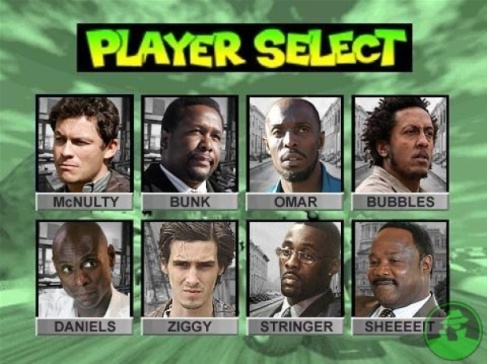In his essay “All in the Game,” Mittell is quick to admit that the type of interactivity afforded by videogames (in the sense of an input-output feedback loop) is incompatible with the static spectatorship inherent to the televisual form of The Wire. Other problematic tensions aside, he instead deploys this surprising metaphor by turning to “the ludic elements within the show’s diegesis” (3), and ultimately uses this cross-media parallel to illustrate how the show simulates and aesthetcizes the kind of rule systems (i.e. institutional and personal codes) and “systems of interrelated actions” embedded in digital games. In both forms, “procedures are the essential building blocks of narrative, character, and rhetoric, the actions that are undertaken within the parameters of the simulation, the rules of the game” (9).
Indeed, “games” and “codes” assume various metaphorical functions in the televisual narrative of The Wire, and Mittell’s metaphor is useful in its ability to unravel the show’s formal features in a seemingly incompatible framework; but what would a videogame adaptation of The Wire actually look like? Or rather, how would it play? What game genre would such play fall under? How would a game designer translate the show’s narrative complexity, with its novelistic ambitions, thematic scope, and implicit procedural rhetoric, into an interactive ludic system that accounts for player intervention and agency in its procedural articulation of narrative?
There are a lot of hypothetical design decisions to be made here. Perhaps one way to re-imagine The Wire as a videogame is to (humorously) distill all of its narrative complexity into the limited form of a 16-bit role-playing game, as CollegeHumor did a few months ago in an animated viral video. The primitive RPG imagined in this video has the player assume the role of a character, whereas Mittell draws comparisons to the simulatory logics and bird’s-eye perspective of “god games” like SimCity and The Sims, and comically exaggerates the frustration associated with rule systems overriding the individual — indeed, it’s hard to imagine a Wire videogame that’s “fun” (whatever that means), unless it thematically deviates from the tragedy of its source material and aims for loftier ambitions by allowing for different outcomes based on player choices, or the possibility of a character winning “the game.”

Wow, that CollegeHumor video is fantastic.
Also, I agree with what you’re saying about the difficulties of creating a video game based on this show, and it’s a problem any video game based on a television series is going to run into, but some have tried to combat it. For instance, numerous video games based on 24 came out, and they sold them by having Jack Bauer and his friends stop terrorism in situations you hadn’t seen on the show. The value of it was that you got to play with characters you know, but they were placed in new situations. Still, 24 is a show where each season is a separate arc with a separate mystery to solve and set of culprits to catch, so putting the characters into a video game runs along the same lines as just inventing a new season (for similar reasons, a Law & Order video game would work quite well). The problem with trying something like that with The Wire, as you alluded to, is that there is no winning on The Wire, and the point of the video game (if it were at all true to the show) could never be to solve all of Baltimore’s institutional problems. Perhaps it could be sold as an Omar spinoff in a “Grand Theft Auto” type of game, but that would be a very poor representation of the series.